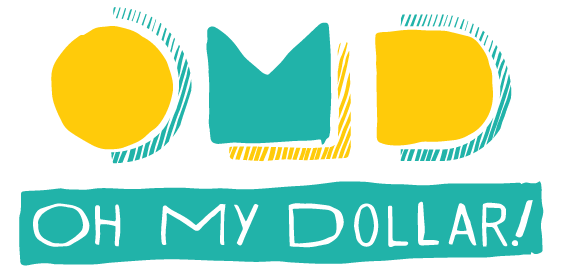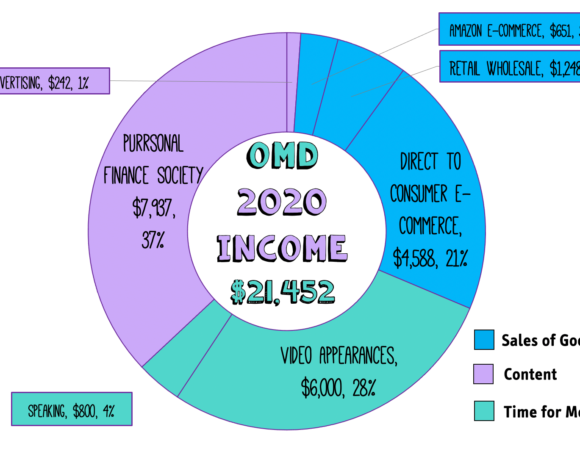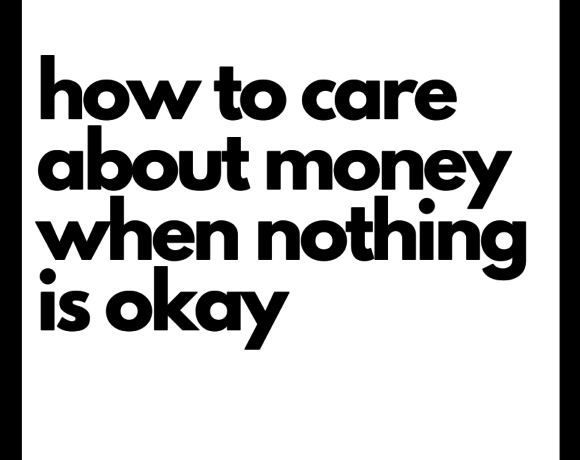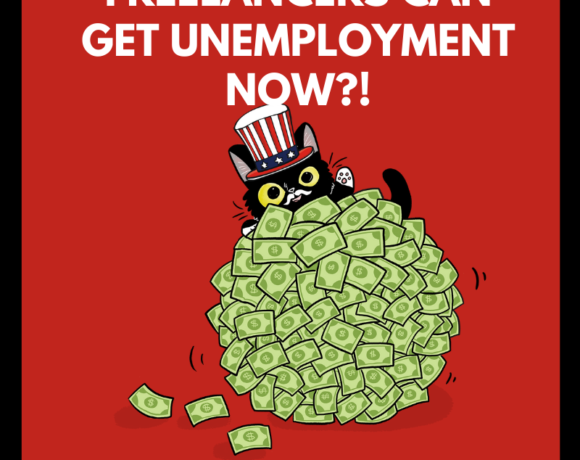I answer three listener questions that didn’t make the livestream this week:
- what to do with your $1,200 if your job is stable right now? [at 1:54]
- how to get your stimulus bill if you don’t have a bank account [at 4:57]
- can they take back your unemployment overpayment? [at 7:25]
I answered a lot more questions on the livestream this weekend, you can watch or listen (like a podcast) to the replay at youtube.com/anomalily and subscribe to be notified of the next one.
Two Corrections [at 11:51]:
- In How to get health insurance if you lose your job and those $1,200 checks I stated about the stimulus checks – “If you make $75,000, the amount goes down slightly from $1,200, for each additional $1000 you make over that, until it completely phases out at $99,000.” – In fact, it is slightly more granular than that. For each $100 you make over $75,000, the amount goes down.
- In How to get health insurance if you lose your job and those $1,200 checks I also stated that “With COBRA, you will have a 104-percent admin fee, altogether”, when in fact the total fee is 102%.
Send me your questions!
Many have questions about how personal finance is rapidly changing in these unprecedented times – it seems like many of the rules are now suspended. So I’ll be answering whatever your questions are about changes to universal credit, unemployment, student loans, health insurance – and if you ask, I will explain what’s going on with the stock and bond markets.
So, please write in your questions to questions@ohmydollar.com or tweet me @anomalily and I’ll try to answer every single question I get in a few episodes over the next week. I’d also love to just hear just little audio updates about how you’re doing in the world. You can leave a voicemail in the US at (503) 877-4338 or you can email us a voice memo to questions@ohmydollar.com
Oh My Dollar! news
There will definitely be another Talking Dough and Eating Donuts: Social Distancing livestream soon – Subscribe on youtube and hit the “bell” icon for notifications to get an alert when we go live.
We’re supporting one another and sharing pet photos on the Oh My Dollar forums, a friendly, nonjudgemental online community about money – come join us, we’re nice!
Email us any financial worries, successes, or health care questions at questions@ohmydollar.com or tweet us at @anomalily or @ohmydollar.
Purrsonal Finance Society Members
We absolutely love our Purrsonal Finance Society Members, the folks that generously support Oh My Dollar with $1 or more a month on Patreon – and have made is so we have free, full transcripts for every show.
Thank you so much to our newest patrons who joined this week – Jessica and Christy! This episode was underwritten by patrons Tamsen G Association, Galina S, Hank G, and Warrior Queen. To learn more about being part of the Purrsonal Finance Society and get cool perks like cat stickers, you can visit ohmydollar.com/support
Other Episodes You Might Find Interesting
- A recession is coming, how can you be ready?
- Untangling COBRA and Healthcare.gov premiums
- How to get health insurance if you lose your job and those $1,200 checks
Episode Transcript (supported by our Patrons and provided by DSW Transcription)
[00:00:04] Hey, friends, before I get started today, I just want to say thank you. During this time of economic overwhelm, I’m trying to do everything I can to get you the information you need to stay financially secure and answer the questions you have about what’s going on. You should know that I would absolutely not be able to do this without support from our Purrsonal Finance Society on Patreon – the folks that support Oh My Dollar!’s reporting, transcripts, and all the server costs to bring you this show and forums. Every single dollar counts, and it makes a huge difference right now. To learn more, you can visit ohmydollar.com/support. Special shout out to our newest Patrons who joined this week, Christy and Jessica!
[00:00:55] Welcome to Oh My Dollar!, the personal finance show, usually, with a dash of glitter. Currently, we’re just trying to get through. Dealing with money can be scary and stressful. Here, we give practical, friendly advice about money that helps you tackle the financial overwhelm. I’m your host, Lillian Karabaic. Let’s talk about money.
[00:01:17] Hey folks, this is a relatively quick episode. These were a couple of questions that I was not able to get to during the livestream this weekend. The livestream has a ton of information, so you can go watch that replay on youtube.com/anomalily. I answered questions about hyperinflation, unemployment, how long this whole fiscal stimulus package is sustainable for – all of that. But there were three questions that came in that I didn’t get a chance to answer during the livestream, so I thought I’d bring them up now.
[00:01:51] Our first question is from Haley:
[00:01:55] Haley: Hi, Lillian, it’s Haley from Pennsylvania. I have a strange question. I find myself not actually hindered financially by the current situation. If anything, my financial situation has improved slightly because of coronavirus. Survivor’s guilt and everything aside, what would your recommendations be for the best way for me to utilize this extra money? What’s a good place for me to put it? What’s a good thing for me to do with it, now that I have it, given the particular situation that we have? I do have about $9,000 in consumer credit card debt that I’m chipping away at, but I don’t have any other debts. I have a Roth IRA. Should I put it in there? Let me know what you think. Thanks!
[00:02:50] Well, Haley, that is an excellent question. I think the first thing to do is to take care of yourself. Right now, I’m telling people that are in a good situation because of extra money, extra hours – whatever they’re getting as a result of COVID-19 – to put themselves in a position where they could still be okay if they lost their job tomorrow. There is so much uncertainty in this economy, I think it’s best to act as though you do have a temporary employment situation, if not for health and everything else.
[00:03:22] While you said you have consumer debt – -and usually I would say to focus on that with extra money – right now, what I am going to say is save your cash. Cash is king right now! That is because it gives you a lot of flexibility. What I’m going to say is if you don’t have a cash cushion, I wouldn’t put it in your IRA, right now. That’s simply because I think it’s best to be saving cash, and you get a lot less flexibility with that Roth IRA. There were some new provisions made, where they allow you to take some money out of that IRA, but the stock market is doing all sorts of wild things, right now.
[00:03:56] So, the Roth IRA makes it a little harder to get to your money, whereas saving cash, right now, you can invest that in your Roth IRA later, or you can use it to pay down your debt. Cash gives you a lot of flexibility. Worst case scenario, you’ve saved some money, after you’ve come out of this, and you can use it to throw at some big goals. There’s so much uncertainty, right now, I do think a cash cushion is one of the best things.
[00:04:19] If you’re like, “Hey, no, I really meant it. I have a very big cash cushion,” if you’ve got some credit card debt that you are chipping away with, I would say pay down a little bit of that credit card debt, right now. If you’re in such a fortunate situation that you can pay down all $9,000 of that credit card debt, it will be awesome to have that gone. If you’re making a lot of overtime or something, right now, make sure that you are in your most secure position, right now, with all of this uncertainty in the economy.
[00:04:57] Listener: Hi, I caught part of your show. Had a question on the stimulus checks. My son is unemployed. Last year, I think we were able to claim him as a dependent. He’s over 21; does not have a bank account. This year, he is not being considered as a dependent on federal filing. How will he get his stimulus money, or will he be qualified for it? Thank you.
[00:05:29] So, this is actually quite a simple answer. If you already filed for the year of 2019 for taxes, which was originally due on April 15, but now is not due til July 15, and you listed your son as a dependent, then he will not get that $1,200. The only way that he would get that stimulus check is if you have not filed for that yet, and on 2018 taxes, he was listed as independent. You mentioned that he was over 21, but not if he was under the age of 24. 24 is the cutoff at which someone can be considered a dependent, as your adult child. If your son is not a dependent for this tax year, then, on your federal taxes, then that means that he will get that $1,200 back when he files for the 2020 tax year.
[00:06:22] You mentioned that he doesn’t have a bank account. Then, he would be getting cut a check. So, if he is qualified for it, the check will get sent to him. I think it’s going to be taking quite a long time. If he has not yet filed for 2019, even if he was unemployed in 2019, if he had any income whatsoever, or if he was a student, or something like that, he should file for the 2019 tax year. You might want to open a bank account for him if you want him to get the money fast. Input his ACH information in there.
[00:06:55] That being said, having him be … If he didn’t have any income last year, then claiming him as a dependent – if he lived with you and more than 50 percent of his support came from you last year, then he would count as your dependent, and the tax write off that you would get for having him as a dependent on your taxes is actually going to be higher than that $1,200 stimulus check. I hope that helps. Let me know if you have more questions.
[00:07:25] We had one other listener write in with a question to follow up from our unemployment episode and essentially said, “Hey, I’m wondering what the statute of limitations is of how long they can ask you to pay stuff back, if they found that they gave you too much unemployment?” This is one of those things that’s going to end up being way more risky for freelancers, because as I am reporting on in a future episode, it’s all a mess, right now. Essentially, most of the states have no plan for how they’re going to implement freelancer unemployment. While we were all encouraged to apply for it as quickly as possible, if you’re a small business owner, or a freelancer that was qualified for it, the states are quickly saying, “We’re more overwhelmed than we ever have been, and we have decades-old systems. We literally can’t implement this.”
[00:08:14] The states are varying on what they’re telling people to do. Some states are saying, “Please, just apply, get into the system, get denied, and then we can get you that extra $600 a week when we figure this out.” Then, other states are saying, “Hold off, please don’t do this. We have too much to process. We’ll let you know when we have an update.” Because of that, it can be really challenging to figure out – as a freelancer – how you’re actually supposed to apply for and enroll in unemployment.
[00:08:42] The problem here is that, while it’s pretty easy to figure out how much someone has made, if they’ve had a traditional W-2 job, and they’ve been laid off, or furloughed, it gets way more complicated when you have freelancers, and self-employed people because we pay a lot more business expenses, as self-employed people. Not only do we get things like home office deduction, we have to pay for the goods that we ship out; we have to pay for services and things that typical W-2 employees don’t have to pay for.
[00:09:09] It becomes this question of, well, what is income? Are we looking at gross income? Are we looking at adjusted gross income? Are we looking at income before or after certain kinds of business deductions? The calculations just get a lot more complicated for freelancers, and small business owners, and because of that, we’re just not sure what it’s going to look like. Every state is going to approach it a little bit differently, most likely. Because of that. You run the risk of what’s called overpayment; overpayment is essentially what happens when they end up giving you more money, and they give you more money because of either your information being incorrect, or the way they’re interpreting it being incorrect.
[00:09:54] You asked this question, and it was very interesting. I ended up talking to a couple employment lawyers on the phone and ended up finding a comprehensive legal review of the different cases of overpayment in different states and how every state handles it. The simple answer to it is that there is no simple answer to it. It does vary by state. The problem here is that the variable times go anywhere from one year to the rest of your life. They consider it differently.
[00:10:26] There is either an error on their part for overpayment, or what they consider to be fraud. Fraud is one of those things that can be something where you obviously weren’t trying to defraud the government, but maybe you just forgot, on a weekly basis, when you were claiming unemployment, that you did some piecemeal work. The big problem with fraud overpayment, what they classify as fraud overpayment, is a lot of states have no statute of limitations on the discovery for it. So, some of them, they can continue to collect the money from you if they find it 10 or 15 years later, and they also tack on a penalty, and you have to pay them back. That’s a really extreme case.
[00:11:09] What I’m also going to say is this is unprecedented times, and state unemployment offices are trying so hard to figure out what’s going on. A lot of them are hiring hundreds of workers to try to get through the backlog, right now. We have more people unemployed than we have had in 50 years. The systems are not set up to handle that. Because of that, I think everybody just trying to do their best, right now, is likely what’s going to happen. I don’t think there’s going to be a huge amount of auditing going into this. That being said, try to report truthfully. Just follow along with what they say, as far as how they communicate with you. We’ll see what happens with it.
[00:11:52] Two quick corrections from previous episodes. One is that I stated that the extra $1,200 you were going to get goes down by each extra $1000 that you make, but it actually goes down in increments of extra $100 that you make. Functionally the same, but the amounts are slightly different. So, if you do make between $75,000 and $99,000, you should go look up how much you’re going to get because it changes for each $100 you make over $75000 a year.
[00:12:24] Second correction is that I misstated the amount of the administrative fee that COBRA charges. I said that it would be 104 percent, and I meant to say it would be 102 percent of the premium. I also slightly did the math wrong, but functionally, it’s the same thing. If you have a plan that cost your employer $400, and you currently pay $200 a month for health insurance, and you lose your job, and you choose to opt into COBRA, then you will be paying the $400, the total amount that both you and your employer pay, and then you will also pay an extra two percent. So, that would put you at $404. I misstated and said $440 because, apparently, I have a degree in a math-related field, but I can’t do basic percentages.
[00:13:14] So, I think that wraps our short little episode for today. I will be out with more episodes and back in your ears – as creepy as that sounds – as soon as I possibly can. This week, we’re looking at how the unemployment system is truly not built to handle something of this scale in this country. Just listen to one person’s experience trying to file.
[00:13:34] Listener: I’ve probably tried to call in 300 times, and I can’t get anybody on the phone. So, I just- I got that piece of mail, and I sat down at my table, and I just wrote out a hand letter and said, “I can’t get through. Here is my information. Here is how much money I made last year. Here is my claim number from the website. I don’t know what else to do.” I just walked to the mailbox and dropped it in.
[00:14:05] There is a lot more where that came from. I’m also trying to stay connected to you all. I haven’t left my house in over a month, now, but we’re doing these livestreams almost every weekend. If you want to join in for those, I always keep our Purrsonal Finance Society members up to date when they’re coming out, but you can also follow me on Twitter, @anomalily. If you have any questions, you can also tweet me, @anomalily. You can always write your questions into questions@ohmydollar.com. I love to just hear audio updates about how you’re doing in the world. Feel free to send me the tones of staying on hold with unemployment. You can leave us a voicemail in the U.S. at (503) 877-4338, or you can email us a voice memo to questions@ohmydollar.com.
[00:14:52] Oh My Dollar! is usually recorded at the XRAY.FM Studios in Portland, Oregon, but it is currently recorded from a phone box that my cat made a nest in, and now it is covered in cat hair, so if you hear me sniffling, that’s what’s going on. We are syndicated through PRX. This episode was underwritten by the Tamsen G Association, Hank G, Warrior Queen and Galina S. This episode was engineered, and edited, and hosted by me, Lillian Karabaic. Our intro music is by Aaron Parecki. Thank you for listening and, until next time, remember to wash your hands and manage your money so it doesn’t manage you.





